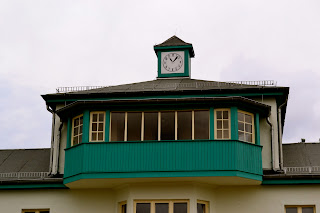8/31
Going to the concentration camp was an interesting
experience. I had all these expectations going in… that it would be so
overwhelming and heartbreaking, everything that you hear about in the movies
and seems to make sense in reaction to such a tramatic event. But the reality
was that it was thought provoking more than anything else.
Barracks where the prisoners lived.
SS tower in front of the role call lines.
Gabe lecturing a bunch of students who are clinging onto every word he says... when is the last time you saw that happen? :)
Entrance to the camp.
After having class in one of the room that was located in
the central planning station of the SS, we went into the camp of the Nazis.
Gabe lined us up at the front under the guard tower and explained that the camp
was strategically designed for the SS to be able to have maximum control, with
minimal officers. So every place in the camp was in sight of one of three
towers, in a triangle around the perimeter. We were side by side and staring in
front as Gabe explained that every prisoner had a number, and in the morning,
and in the evening, they would line up and count off. They could be there
anywhere from an hour to 18, and if someone had run away, it was likely that
another prisoner would be dead by the time the runner was found because of the cold and their fragile health. And I say
found because no one permanently escaped Sachsemsenhausen over the entire war.
Space in-between where the barracks that held the prisoners that were being held in solitary confinement, next to where they hanged prisoners on a regular basis.
It’s sick, but its real. They didn’t necessarily know what
they were doing on a large scale. They were being told that the security and
fate of their families and nation were dependent on this role.
It doesn’t make what they did disappear, but isn’t that the
same story we tell our soldiers? Isn’t the murder and violence that we
contribute to because we believe our ideals to be superior. We don’t like that
Islam keeps such strict control on their women, that their faith is prioritized
over our ideals, and that they are all out to get us. We make ourselves the
good guys because were defending what we believe to be good.
Nazi’s were not good. Their agenda, message, and goals were
not good. But if I was in Germany, as a teenager, a few decades ago, would I
have known the difference?
Lock inclosing the prisoners who had their own cell. Today, there are memorials for many of the victims who once lived there in each of the cells.
He told another story of a man who had served as an officer of the SS. In the aftermath of the war, he became a Christian, and his was one of the stories that brought Gabe back to Christianity. Gabe realized that the brainwashing by the Nazi's was possible because of the voids left from a lack of faith. It was, in so many ways the religion of a people who were trying to fill a void that was never going to be filled by anything but Christ.






No comments:
Post a Comment